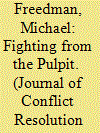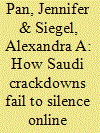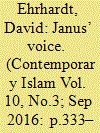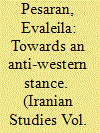|
|
|
Sort Order |
|
|
|
Items / Page
|
|
|
|
|
|
|
| Srl | Item |
| 1 |
ID:
170194


|
|
|
|
|
| Summary/Abstract |
Religious leaders greatly influence their constituents’ political behavior. Yet, it is unclear what events trigger nationalist attitudes among religious leaders and why this effect occurs more among some religious leaders rather than others. In this article, I examine the content of Israeli Rabbinic rhetoric during different military and political conflicts. Drawing on an original collection of Sabbath pamphlets distributed to Synagogues, I demonstrate that religious rhetoric is highly responsive to levels of violence for the Israeli–Palestinian conflict. I find that religious rhetoric and tone are more nationalist during conflict with the Palestinians and that this effect is mediated by religious ideologies toward the state. In contrast, religious rhetoric does not respond to military conflict in Lebanon or other internal Israeli political conflicts. These findings highlight under what conditions religious leaders infuse conflict with a religious tone, arguably making it harder to gain support for political compromise among the religious public.
|
|
|
|
|
|
|
|
|
|
|
|
|
|
|
|
| 2 |
ID:
171338


|
|
|
|
|
| Summary/Abstract |
Saudi Arabia has imprisoned and tortured activists, religious leaders, and journalists for voicing dissent online. This reflects a growing worldwide trend in the use of physical repression to censor online speech. In this paper, we systematically examine the consequences of imprisoning well-known Saudis for online dissent by analyzing over 300 million tweets as well as detailed Google search data from 2010 to 2017 using automated text analysis and crowd-sourced human evaluation of content. We find that repression deterred imprisoned Saudis from continuing to dissent online. However, it did not suppress dissent overall. Twitter followers of the imprisoned Saudis engaged in more online dissent, including criticizing the ruling family and calling for regime change. Repression drew public attention to arrested Saudis and their causes, and other prominent figures in Saudi Arabia were not deterred by the repression of their peers and continued to dissent online.
|
|
|
|
|
|
|
|
|
|
|
|
|
|
|
|
| 3 |
ID:
075915


|
|
|
|
|
| Publication |
2006.
|
| Summary/Abstract |
In the wake of 7/7, the British Government assembled seven Muslim working parties to address a range of issues that might contribute to an environment less hospitable to the creation of further suicide bombers. The resulting recommendations envisaged an outward-looking Islamic leadership engaging Muslim youth, local schools, public and civic bodies, as well as being hospitable to other faith groups. This article aims at shedding some light on the status and training, as well as the religious discourses and tasks of religious leaders in British Pakistani communities. The conclusion will discuss their capacity for being bearers of bridging social capital, as auspicated by the government.
|
|
|
|
|
|
|
|
|
|
|
|
|
|
|
|
| 4 |
ID:
148227


|
|
|
|
|
| Summary/Abstract |
This article analyses the role of religious leaders in collective violence in Kano, the major urban centre in northern Nigeria. It compares two episodes of collective action in the city—the violent ‘Plateau riots’ in 2004 and the non-violent ‘cartoon protests’ in 2006—to explore the role of religious leaders in the variation in violence between the two events. The core argument is that the ways in which Islamic and Christian preachers framed the triggering events for these cases facilitated different forms of mobilisation and enemy identification in response. In 2004, the interpretation of violence in Plateau State through the ‘Christians-versus-Muslims’ frame allowed for mobilisation within Kano’s Christian and Muslim communities as well as for the identification of local Christians as enemies. In 2006, in contrast, the infamous Danish cartoons were actively framed as part of the global struggle between faithful Nigerians and nonreligious Westerners, facilitating non-violent mobilisation across Christian-Muslim boundaries. Thus, the divergent discursive strategies employed by religious leaders are likely to have contributed to violent escalation in 2004 and to peaceful mobilisation in 2006. At the same time, however, the article emphasises the interaction of discursive framing with other factors, such as the role of security forces and the inextricable connections between religious and political authorities in Kano. The article is based on mixed-methods data collected in Kano between 2006 and 2012, including perceptions survey data, semi-structured interviews, and newspaper articles.
|
|
|
|
|
|
|
|
|
|
|
|
|
|
|
|
| 5 |
ID:
186711


|
|
|
|
|
| Summary/Abstract |
Experts agree that vaccination is the most effective way to bring the COVID-19 pandemic under control. Nevertheless, vaccination rates have slowed nationwide and substantial segments of the population report an unwillingness to get vaccinated. We conducted an online survey experiment to investigate whether endorsement messages from various types of leaders can encourage the unvaccinated population to receive the vaccine. We surveyed 709 unvaccinated registered voters in South Dakota in April 2021 and presented them with identical messages endorsing vaccination from a political, religious, or medical leader. Our results show that messaging from a religious leader had a positive and statistically significant effect on interest in getting vaccinated, whereas messages from a political or medical leader had no statistically significant effect. These results strongly suggest that religious leaders are more effective messengers than other potential messengers and that public health officials would be well served to coordinate their efforts with leaders in faith communities.
|
|
|
|
|
|
|
|
|
|
|
|
|
|
|
|
| 6 |
ID:
191644


|
|
|
|
|
| Summary/Abstract |
When Ugandan parliamentarians passed a new Anti-Homosexuality Bill in March 2023, they reportedly did so under pressure from, and with the enthusiastic support of, religious leaders.1 In other African countries, too, recent legal and political struggles around LGBTIQ rights often feature religious leaders as key actors in campaigns that incite hate speech against, and contribute to the marginalization of, LGBTIQ communities and actively support or promote anti-LGBTIQ legislation and policies.2 Given this situation, it is easy to view religious leaders as drivers of what has been described as the ‘homophobia spectacle’ that can be witnessed across the continent.3 Even in countries that recently decriminalized same-sex relationships, such as Botswana, church pastors continue to argue that homosexuality is ‘against Christianity’ and therefore ‘should not be allowed in this country’.4 Within international Christian bodies, such as the worldwide Anglican Communion, African church leaders are often associated with anti-LGBTIQ stances.5 For instance, early in 2023, the Anglican churches in Uganda and Kenya strongly rebuked the Church of England for its decision to allow for the blessing of same-sex unions.
|
|
|
|
|
|
|
|
|
|
|
|
|
|
|
|
| 7 |
ID:
188973


|
|
|
|
|
| Summary/Abstract |
This study aimed to explore Bangladeshi religious leaders’ perspectives on the Rohingya refugee crisis and its implications for Bangladesh. We have employed a triangulation of methods composed of content analysis, qualitative intensive interviews and a robust Internet search to conduct the study. Bangladesh has experienced many impacts from the massive influx of the Rohingya into its territory. The Bangladeshi religious leaders reject the Burmese Government’s official narrative that the Rohingya are illegal Bengali immigrants. They condemn the Rohingya’s human rights abuse and opine that Burma must accept the refugees and reinstate their citizenship. The article, in the end, offers some pragmatic policy recommendations to surmount the Rohingya crisis.
|
|
|
|
|
|
|
|
|
|
|
|
|
|
|
|
| 8 |
ID:
085334


|
|
|
|
|
| Publication |
2008.
|
| Summary/Abstract |
The Iranian Revolution of 1979 saw the mobilization and cooperation of a variety of groupings that were brought together by their shared determination to overthrow the Shah. However, it was not only opposition to the Pahlavi regime, but also suspicion of and disdain for that regime's Western backers that united these revolutionary groups. Religious leaders (ulama), merchants (bazaaris), intellectuals and students alike all espoused the strong anti-Western sentiments that had been developing in Iran over the previous two decades. But what particular factors can be seen to have encouraged the adoption of these sentiments in the lead-up to the revolution, and in what ways were they articulated and subsequently put into practice by the leaders of the new regime? This article suggests that various domestic and international influences can be seen to have shaped the emergence of Iran's revolutionary discourse of "economic independence." In particular, the paper argues that a peculiar blend of Shi'i concepts of social justice and Marxist-Leninist discourses of class struggle and anti-imperialism not only informed the economic outlook of Iran's burgeoning revolutionary movement during the period 1953-79, but was also enshrined in the Constitution of the Islamic Republic.
|
|
|
|
|
|
|
|
|
|
|
|
|
|
|
|
|
|
|
|
|